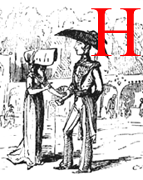 ENRY BROUGHAM was born in Edinburgh on the 19th September, 1778. He was educated at the High School and the University of Edinburgh, and in the year 1800 was admitted to the Scottish bar. In 1807, when he was pleading a case of appeal in the House of Lords, he resolved to qualify himself for the English bar, and in 1808 he began to practise in the Court of Queen's Bench and on the Northern Circuit. He was returned to the House of Commons for the borough of Camelford in 1810, and he soon became a rival of George Canning, and his most powerful opponent in the great political questions which then agitated the country.
ENRY BROUGHAM was born in Edinburgh on the 19th September, 1778. He was educated at the High School and the University of Edinburgh, and in the year 1800 was admitted to the Scottish bar. In 1807, when he was pleading a case of appeal in the House of Lords, he resolved to qualify himself for the English bar, and in 1808 he began to practise in the Court of Queen's Bench and on the Northern Circuit. He was returned to the House of Commons for the borough of Camelford in 1810, and he soon became a rival of George Canning, and his most powerful opponent in the great political questions which then agitated the country.
On the dissolution of Parliament in 1812, Mr. Brougham failed in contesting with Mr. Canning the representation of Liverpool, and he was thus excluded from the House of Commons during the long period of five years. In 1816, however, he was returned for Winchelsea, a borough which be represented till 1830, when he resigned it on account of some difference of opinion with its patron, the Earl of Darlington. He was, however, immediately returned for Knaresborough; and on the death of George IV he successfully contested the county of York, and thus occupied a position which added the influence of a great constituency to that which he already possessed in Parliament. Mr. Brougham now stood forth the champion of parliamentary reform, and the House of Commons had no sooner met than he announced for the 16th November his intention to bring in a Bill embracing a comprehensive measure of reform — the enfranchisement of large towns, the reduction of rotten boroughs, the curtailment of the English and Irish representation, and the grant of the franchise to copyholders, leaseholders, and all householders whatever. A ministerial crisis, however, supervened. The Duke of Wellington having been defeated on a government measure resigned, and the formation of a new Government under Earl Grey, including Lord Brougham and Vaux as Lord Chancellor of England, who had not previously filled any of the subordinate law offices of the Crown, placed in the bands of the ministry the great question of parliamentary-reform.
But though no longer a representative of the people, and personally relieved from the charge of the Reform Bill, his best powers were called forth in support of it; and his speech on the 7th October, 1831, when the Bill was read a second time in the House of Lords, was a display of eloquence of the highest order. He occupied the Woolsack from 1830 to 1834. Wherever oppression, under the form of English law, struck at an individual or crushed a race, the heart and head of Brougham were combined to defend and relieve them. His defence in 1824 of Mr. Smith, a Wesleyan missionary against the slaveholders of Demerara, and in 1825 of another missionary expelled from Barbadoes, had a salutary influence far beyond the localities of the oppression. His exertions, too, in the abolition of colonial slavery, and in suppressing the slave trade, will ever be one of the brightest leaves in his chaplet.
The same indomitable hatred of illegal power, whether exercised against the high or the low, was exhibited in 1820 and 1821 in his defence of Queen Caroline, when she laid claims to the honours of queen-consort on the accession of George IV to the throne. As her attorney-general he pled her cause in the House of Lords in the trial for her divorce, and before the Privy Council for her right to coronation, and by these two remarkable displays of forensic eloquence his reputation and popularity were greatly extended. In the year 1834 the reform government, under which Lord Brougham had done so much for his country, quitted office, and was succeeded by the short-lived ministry of Sir Robert Peel
In 1835 the Whigs returned to power, with Lord Melbourne as Premier and Lord John Russell as Home Secretary; but from causes much to be deplored, Lord Brougham was excluded from the Cabinet. The ties which bound him to the Whigs as a party being now dissolved, he was at liberty to take an independent course in Parliament, when he criticised the acts of both parties, and sometimes brought forward measures of his own. His conduct in this respect was very unjustly blamed, and he was charged with abandoning the Whig principles which he maintained while in office. . . . he died on the 9th of May, 1868. >/p>
Bibliography
Ewald, Alexander Charles, F. S. A. The Life and Times of William Ewart Gladstone. 5 vols. London: William Mackenzie, n.d. I, 109-11.
Created 11 January 2002
Last modified 12 January 2020